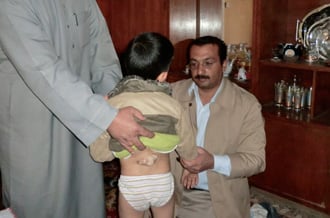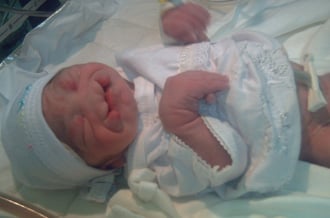Honest, paywall-free news is rare. Please support our boldly independent journalism with a donation of any size.
Fallujah, Iraq – While the US military has formally withdrawn from Iraq, doctors and residents of Fallujah are blaming weapons like depleted uranium and white phosphorous used during two devastating US attacks on Fallujah in 2004 for what are being described as “catastrophic” levels of birth defects and abnormalities.
Dr Samira Alani, a paediatric specialist at Fallujah General Hospital, has taken a personal interest in investigating an explosion of congenital abnormalities that have mushroomed in the wake of the US sieges since 2005.
“We have all kinds of defects now, ranging from congenital heart disease to severe physical abnormalities, both in numbers you cannot imagine,” Alani told Al Jazeera at her office in the hospital, while showing countless photos of shocking birth defects.
As of December 21, Alani, who has worked at the hospital since 1997, told Al Jazeera she had personally logged 677 cases of birth defects since October 2009. Just eight days later when Al Jazeera visited the city on December 29, that number had already risen to 699.
“There are not even medical terms to describe some of these conditions because we've never seen them until now,” she said. “So when I describe it all I can do is describe the physical defects, but I'm unable to provide a medical term.”
'Incompatible with life'
Most of these babies in Fallujah die within 20 to 30 minutes after being born, but not all.
Four-year-old Abdul Jaleel Mohammed was born in October 2007. His clinical diagnosis includes dilation of two heart ventricles, and a growth on his lower back that doctors have not been able to remove.

Four-year-old Abdul Jaleel Mohammed has birth defects and health problems that his family blames on depleted uranium exposure from the 2004 US military attacks on Fallujah. (Photo: Dahr Jamail / Al Jazeera)
Abdul has trouble controlling his muscles, struggles to walk, cannot control his bladder, and weakens easily. Doctors told his father, Mohamed Jaleel Abdul Rahim, that his son has severe nervous system problems, and could develop fluid build-up in his brain as he ages, which could prove fatal.
“This is the first instance of something like this in all our family,” Rahim told Al Jazeera. “We lived in an area that was heavily bombed by the Americans in 2004, and a missile landed right in front of our home. What else could cause these health problems besides this?”
Dr Alani told Al Jazeera that in the vast majority of cases she has documented, the family had no prior history of congenital abnormalities.
Alani showed Al Jazeera hundreds of photos of babies born with cleft palates, elongated heads, a baby born with one eye in the centre of its face, overgrown limbs, short limbs, and malformed ears, noses and spines.
She told Al Jazeera of cases of “thanatophoric dysplasia”, an abnormality in bones and the thoracic cage that “render the newborn incompatible with life”.
Rahim said many of his relatives that have had babies after 2004 are having problems as well.
“One of them was born and looks like a fish,” Rahim said. “I also personally know of at least three other families who live near us who have these problems also.”
For now, the family is worried how Abdul will fare in school when he is enrolled next year. Maloud Ahmed Jassim, Abdul's grandfather, added, “We've seen so many miscarriages happen, and we don't know why.”
“The growth on his back is so sensitive and painful for him,” Rahim said. “What will happen in school?”
Jassim is angered by a lack of thorough investigations into the health crisis.
“Why is the government not investigating this,” he asked. “Western media seem interested, but neither our local media nor the government are. Why not?”
In April 2011, Iraqi lawmakers debated whether the US attacks on the city constituted genocide. Resolutions that called for international prosecution, however, went nowhere.
Scientific proof
Alani, along with Dr Christopher Busby, a British scientist and activist who has carried out research into the risks of radioactive pollution, collected hair samples from 25 parents of families with children who have birth defects and sent them to a laboratory in Germany for analysis.
Alani and Busby, along with other doctors and researchers, published a study in September 2011 from data obtained by analysing the hair samples, as well as soil and water samples from the city.
Mercury, Uranium, Bizmuth and other trace elements were found.
The report's conclusion states:
“Whilst caution must be exercised about ruling out other possibilities, because none of the elements found in excess are reported to cause congenital diseases and cancer except Uranium, these findings suggest the enriched Uranium exposure is either a primary cause or related to the cause of the congenital anomaly and cancer increases. Questions are thus raised about the characteristics and composition of weapons now being deployed in modern battlefields.”
“As doctors, we know Mercury, Uranium and Bismuth can contribute to the development of congenital abnormalities, and we think it could be related to the use of prohibited weapons by the Americans during these battles,” Alani said.

“Findings suggest the enriched Uranium exposure is either a primary cause or related to the cause of the congenital anomaly and cancer increases,” says a recent scientific report on the incidence of birth defects in Fallujah. (Photo: Dr Samira Alani)
“I made this link to a coroner's inquest in the West Midlands into the death of a Gulf War One veteran… and a coroner's jury accepted my evidence,” he told Al Jazeera.
“It's been found by a coroner's court that cancer was caused by an exposure to depleted uranium,” Busby added, “In the last 10 years, research has emerged that has made it quite clear that uranium is one of the most dangerous substances known to man, certainly in the form that it takes when used in these wars.”
In July 2010, Busby released a study that showed a 12-fold increase in childhood cancer in Fallujah since the 2004 attacks. The report also showed the sex ratio had declined from normal to 86 boys to 100 girls, together with a spread of diseases indicative of genetic damage similar to but of far greater incidence than Hiroshima.
Dr Alani visited Japan recently, where she met with Japanese doctors who study birth defect rates they believe related to radiation from the US nuclear bombings of Hiroshima and Nagasaki.
She was told birth defect incidence rates there are between 1-2 per cent. Alani's log of cases of birth defects amounts to a rate of 14.7 per cent of all babies born in Fallujah, more than 14 times the rate in the affected areas of Japan.
A contaminated country?
In Babil Province in southern Iraq, the head of the Babil Cancer Centre, Dr Sharif al-Alwachi, said cancer rates have been escalating at alarming rates since 2003, for which he blames the use of depleted uranium weapons by US forces during and following the 2003 invasion.
“The environment could be contaminated by chemical weapons and depleted uranium from the aftermath of the war on Iraq,” Dr Alwachi told Al Jazeera. “The air, soil and water are all polluted by these weapons, and as they come into contact with human beings they become poisonous. This is new to our region, and people are suffering here.”
The US and UK militaries have sent mixed signals about the effects of depleted uranium, but Iraqi doctors like Alwachi and Alani, and along with researchers, blame the increasing cancer and birth defect rates on the weapon.
Abdulhaq Al-Ani, author of Uranium in Iraq, has been researching the effects of depleted uranium on Iraqis since 1991. He told Al Jazeera he personally measured radiation levels in the city of Kerbala, as well as in Basra, and his Geiger counter was “screaming” because “the indicator went beyond the range”.
Alani explained that she is the only doctor in Fallujah registering cases of congenital abnormalities.

Dr Samira Alani, who has been working as a pediatrician at Fallujah General Hospital since 1997, has registered 699 cases of birth defects in Fallujah babies since late 2009. (Photo: Dahr Jamail / Al Jazeera)
“We have no system to register all of them, so we have so many cases we are missing,” she said. “Just yesterday a colleague told me of a newborn with thanatophoric dysplasia and she did not register it. I think I only know of 40-50 per cent of the cases because so many families have their babies at home and we never know of these, and other clinics are not registering them either.”
The hospital where Alani does her work was constructed in the Dhubadh district of Fallujah in 2008. According to Alani, the district was bombed heavily during the November 2004 siege.
“There is also a primary school that was built nearby, and from that school alone three teachers developed breast cancer, and now two of them are dead,” Alani said. “We get so many cases from this area, right where the hospital is.”
Even with a vast amount of anecdotal evidence, the exact cause of the health crisis in Fallujah is currently inconclusive without an in-depth, comprehensive study, which has yet to be carried out.
But despite lack of governmental support, and very little support from outside Iraq, Alani is determined to continue her work.
“I will not leave this subject”, she told Al Jazeera. “I will not stop.”
Press freedom is under attack
As Trump cracks down on political speech, independent media is increasingly necessary.
Truthout produces reporting you won’t see in the mainstream: journalism from the frontlines of global conflict, interviews with grassroots movement leaders, high-quality legal analysis and more.
Our work is possible thanks to reader support. Help Truthout catalyze change and social justice — make a tax-deductible monthly or one-time donation today.
